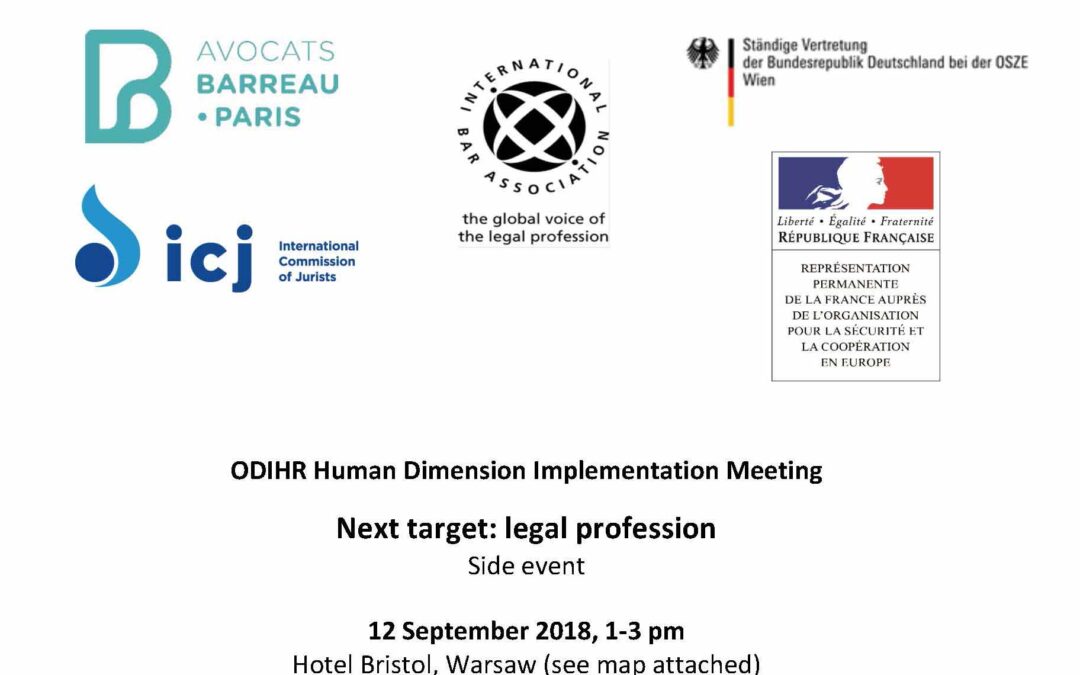
Sep 10, 2018 | Events, News
The legal profession plays a crucial role in ensuring access to justice for all, transparency and accountability of the state, Rule of law and the respect for human rights.
Yet, instead of being perceived as a vital player to the justice sector, today lawyers are often targeted by the governments in many OSCE countries for seeking truth and justice. As a result, lawyers often face high risks of persecution, harassment as well as severe sanctions for doing their job.
This side-event aims to specifically discuss the situation of lawyers in Belarus, Russia, Azerbaijan, Tajikistan and Kazakhstan. The discussion will extend to consider the latest developments related to the rights of lawyers and their independence in the respective countries, and what impact this has on the overall rule of law and human rights situation.
This side event will take place on 12 September 2018, from 13.00 -15.00 at Hotel Bristol, Warsaw
Moderator: Jurate Guzeviciute, Programme Lawyer, International Bar Association’s Human Rights Institute
Presentations and Discussions:
Independence of the legal profession and harassment of lawyers in Eastern Europe and Central Asia:
- Tajikistan: Dilrabo Samadova, lawyer, Tajikistan
- Azerbaijan: Nijat Mammadbayli, lawyer, Azerbaijan
- Kazakhstan: Snezhanna Kim, lawyer, Kazakhstan
- Russia: Róisín Pillay, Director of the Europe Regional Programme, International Commission of Jurists
- Belarus: Anne Souléliac, Head of the Human Rights section, Paris Bar Association
Organizers: Permanent Mission of the Federal Republic of Germany to the OSCE, Permanent Representation of France to the OSCE, International Bar Association’s Human Rights Institute, Paris Bar Association, International Commission of Jurists.
Poland-HDIM_Side event-News-event-2018-ENG (flyer of the event in PDF)
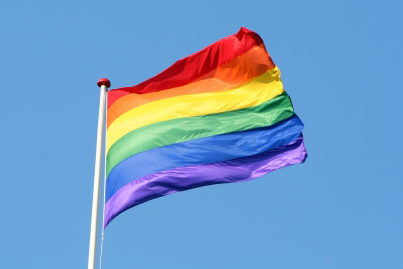
Sep 6, 2018 | News
The ICJ welcomed the Supreme Court’s judgment in Navtej Singh Johar et al v. Union of India and others, which effectively ends the threat to a large segment of the Indian population that they will be held criminally liable for exercising their human rights.
The Court has issued a long-overdue ruling that the criminalization of consensual same-sex relationships under Section 377 violates the Indian Constitution, and is in breach of India’s obligations under international law. This long-awaited judgment testifies to the work of activists and lawyers in India, who have shown the potential of the law to affirm human rights and equality.
“This judgment will not only have an impact in India. Its influence should extend across the world. The ICJ hopes that it will provide an impetus for other countries, especially those of the Commonwealth of Nations, to revoke similar provisions that criminalize consensual sexual relations,” ICJ Asia Pacific Director Frederick Rawski stated.
The Court underscored that provisions of Section 377 contravened international law and standards on equality, privacy, non-discrimination and dignity guaranteed in international human rights treaties to which India is a party. These include the International Covenant Civil and Political Rights and International Covenant on Economic Social and Cultural Rights.
The Court also noted that the Yogyakarta Principles, which address sexual orientation and gender identity in international law, reinforce these protections. This is a vital jurisprudential recognition that LGBTI persons are entitled to full equality, and protection of their rights under India’s Constitutional and international human rights law.
In the judgement, which reverses the December 2013 Koushal decision, the Court held that discrimination based on sexual orientation is a violation of fundamental rights to autonomy, privacy, equality, dignity, and non-discrimination. It underscored that decriminalization of homosexuality is only the first step and that LGBTI persons are entitled to equal citizenship in all its manifestations. The Court also recommended that wide publicity be given to judgment to ensure de-stigmatization of identity through sensitization training on barriers to access to justice faced by LGBTI persons.
“Even a landmark decision by the Indian Supreme Court cannot alone end the discrimination against people based on their sexual orientation or gender identity. It is time for the Indian Parliament to conduct wide-ranging review of existing legal framework, repeal discriminatory laws, and address other gaps in the law that prevent LGBT persons from fully exercising their rights,” Rawski added.
Background
For background, see the ICJ’s July 2018 Briefing Paper on Navtej Singh Johar et al. v. Union of India and Others, and its February 2017 report, “Unnatural Offences”: Obstacles to Justice in India Based on Sexual Orientation and Gender Identity.
Contact
Maitreyi Gupta (Delhi), ICJ International Legal Advisor for India
e: maitreyi.gupta(a)icj.org, t: +91 7756028369
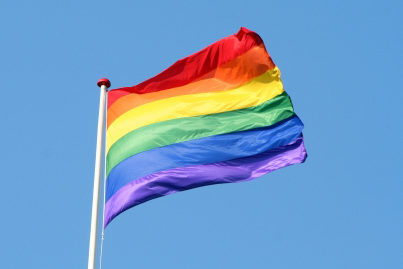
Sep 6, 2018 | Communiqués de presse, Nouvelles
La CIJ s’est félicitée de l’arrêt rendu par la Cour suprême dans l’affaire Navtej Singh Johar et al v. Union of India and others. Cet arrêt met fin à la crainte d’une grande partie de la population indienne d’être tenue pénalement responsable de l’exercice de ses droits.
La Cour a rendu la décision, attendue depuis longtemps, que la criminalisation de relations consenties entre personnes du même sexe enfreint l’article 377 la Constitution indienne, et est contraire aux obligations de l’Inde envers le droit international.
Ce jugement tant attendu témoigne du travail des activistes et des avocats en Inde, qui ont démontré le pouvoir de la loi pour réaffirmer les droits de l’Homme ainsi que l’égalité.
«Ce jugement aura non seulement un impact en Inde mais son influence devrait s’étendre à travers le monde. La CIJ espère que cela incitera d’autres pays, en particulier ceux du Commonwealth, à révoquer des dispositions similaires qui criminalisent les relations sexuelles consenties », a déclaré le directeur de la CIJ pour l’Asie-Pacifique, Frederick Rawski.
La Cour a souligné que les dispositions de l’article 377 contrevenaient au droit international et aux normes internationales en matière d’égalité, de respect de la vie privée, de non-discrimination et de dignité garantis dans les traités internationaux relatifs aux droits de l’Homme auxquels l’Inde est partie prenante.
Il s’agit notamment du Pacte international relatif aux droits civils et politiques et du Pacte international relatif aux droits économiques, sociaux et culturels.
La Cour a également relevé que les Principes de Yogyakarta, qui traitent de l’orientation sexuelle et de l’identité sexuelle en droit international, renforcent ces protections.
Il s’agit d’une reconnaissance jurisprudentielle essentielle selon laquelle les personnes LGBTI ont droit à la pleine égalité et à la protection de leurs droits en vertu du droit constitutionnel indien et du droit international des droits de l’Homme.
Dans l’arrêt, qui annule la décision Koushal de décembre 2013, la Cour a estimé que la discrimination fondée sur l’orientation sexuelle est une violation des droits fondamentaux à l’autonomie, à la vie privée, à l’égalité, à la dignité et à la non-discrimination.
Elle a souligné que la dépénalisation de l’homosexualité n’est qu’un premier pas et que les personnes LGBTI ont droit à une citoyenneté égale dans toutes ses formes.
La Cour a également recommandé qu’une large publicité soit accordée au jugement afin de garantir la dé-stigmatisation de l’identité sexuelle grâce à une formation de sensibilisation sur les obstacles à l’accès à la justice rencontrés par les personnes LGBTI.
«Même une décision historique de la Cour suprême indienne ne peut à elle seule mettre fin à la discrimination à l’égard des personnes en raison de leur orientation sexuelle ou de leur identité sexuelle. Il est temps pour le Parlement indien de procéder à un examen approfondi du cadre juridique existant, d’abroger les lois discriminatoires et de remédier aux autres lacunes de la loi qui empêchent les personnes LGBT d’exercer pleinement leurs droits », a ajouté M. Rawski.
Pour plus d’informations (disponibles uniquement en anglais):
Briefing Paper on Navtej Singh Johar et al. v. Union of India and Others (ICJ, July 2018)
Unnatural Offences”: Obstacles to Justice in India Based on Sexual Orientation and Gender Identity (ICJ, February 2017)
Contact
Maitreyi Gupta (Delhi), conseillère juridique internationale de la CIJ en Inde, e: maitreyi.gupta(a)icj.org, t: +91 7756028369
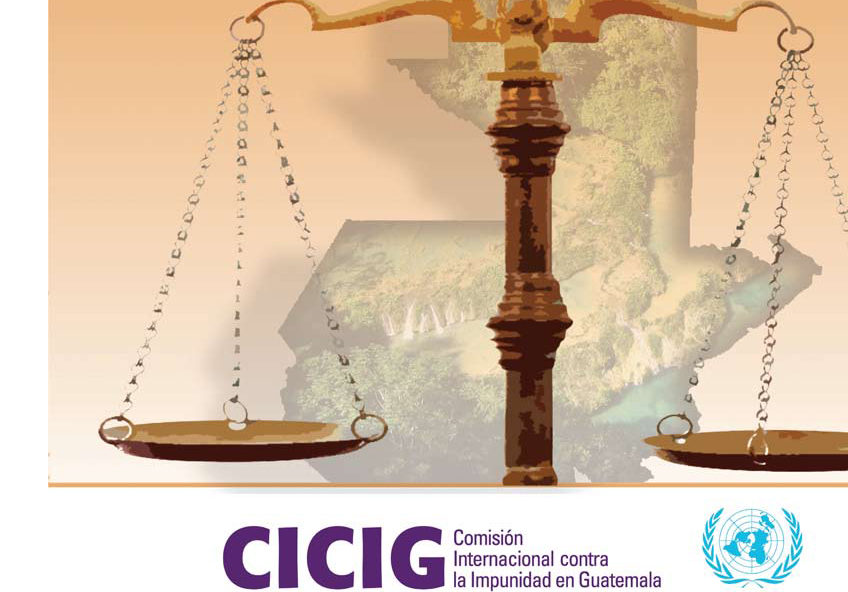
Sep 5, 2018 | News
The ICJ today signed a joint statement with other international organizations based in Europe that cooperate on Guatemala condemning the decision of Jimmy Morales not to renew the mandate of the International Commission against Impunity in Guatemala (CICIG).
The statement also repudiates the subsequent decision by President Morales to bar the CICIG Commissioner Iván Velásquez from returning back to the country.
The CICIG has made a significant contribution to the work of the Public Prosecutor’s Office, the strengthening of the rule of law and the fight against corruption networks.
The statement expresses grave concern that on 31 August 2018 the government used tanks and heavily armed policemen to intimidate CICIG personnel as well as Guatemalan citizens, while announcing the decision not to renew the mandate of the CICIG. “The image of President Jimmy Morales surrounded by the military and police at the press conference evokes the memory of the coup d’état and the military dictatorships during the dark years of the internal armed conflict,” the statement adds.
The organisations signing the statement call on the European Union and its Member States to demand that the state of Guatemala complies with its international obligations and guarantees the necessary conditions for Commissioner Iván Velásquez and the CICIG to continue their work safely and independently.
The full statement is available here: Guatemala-Statement on decision about CICIG and Velasquez-News-2018-ENG
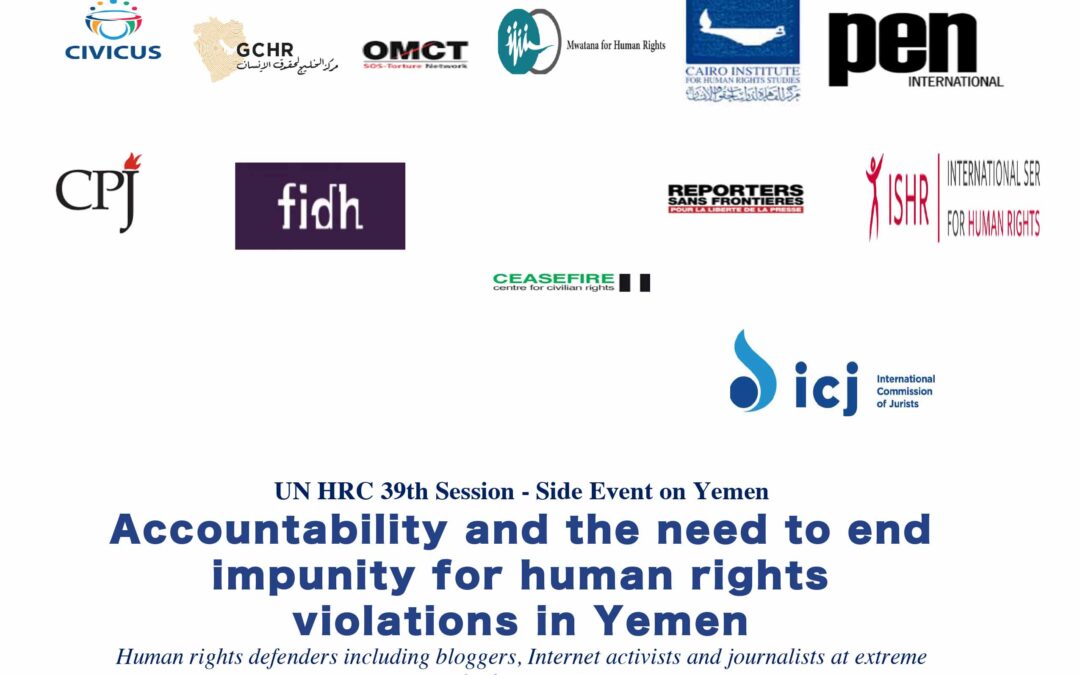
Sep 5, 2018 | Events, News
The ICJ will participate in the side event “Accountability and the need to end impunity for human rights violations in Yemen,” organized by the CIVICUS, FIDH, CIHRS in cooperation with Mwatana for Human Rights and the Gulf Centre for Human Rights (GCHR).
This side event at the Human Rights Council will take place on Monday, 10 September 2018 from 12:00 – 13:00 in room XXIV of the Palais des Nations.
The issue of human rights defenders including bloggers, Internet activists, and journalists who are at extreme risk of persecution will be discussed.
Speakers:
- Radhya Al-Mutawakel, Co-founder and Chairperson of Mwatana for Human Rights
- Khalid Ibrahim, Executive Director, Gulf Centre for Human Rights (GCHR)
- Vito Todeschini, Associate Legal Adviser, International Commission of Jurists (ICJ)
- Miriam Puttick, Head of MENA Programmes, Ceasefire for Civilians Rights
Moderator:
Antoine Madelin, International Advocacy Director, International Federation for Human Rights (FIDH)
Yemen-Side event at HRC-News-events-2018-ENG (download the flyer)









